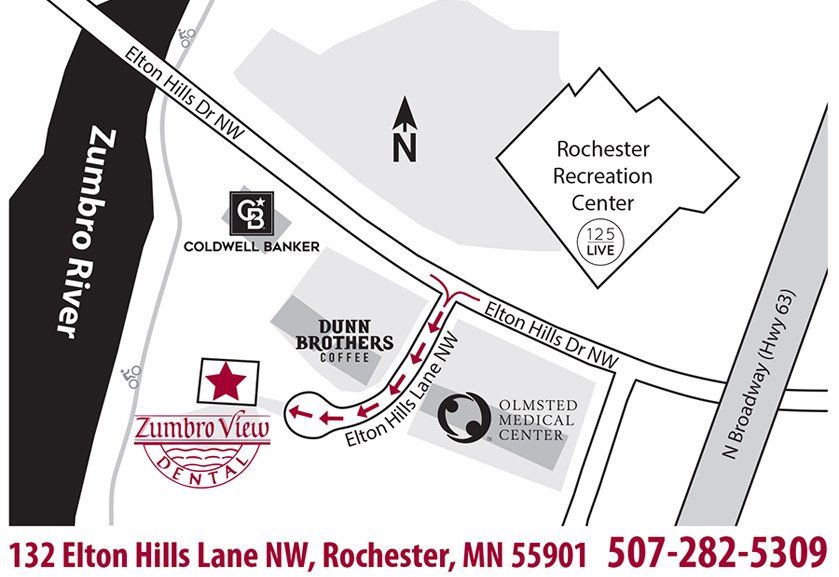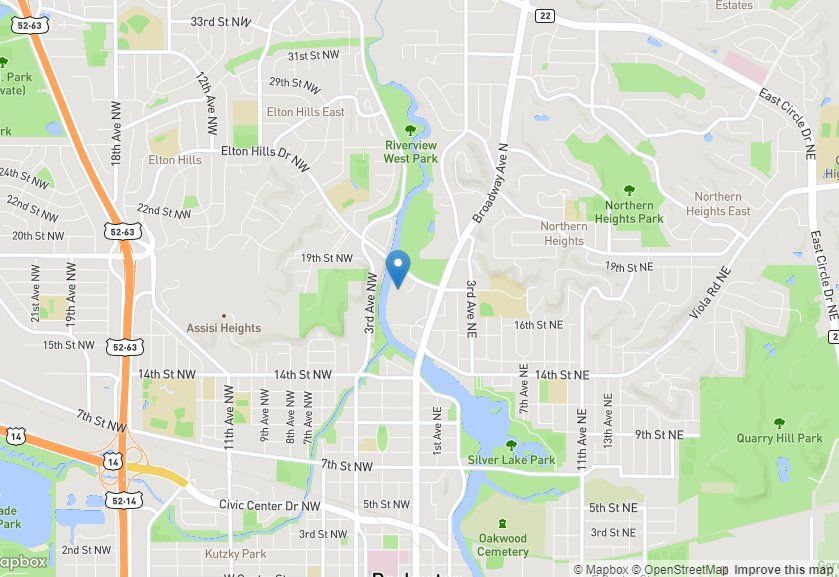35+ Years of Dental Experience | Emergency Services | Works With Insurance
We are happy to provide general information here about Dental Emergencies and Toothaches. If you're a patient with Zumbro View Dental and you are having a dental emergency, please call the office for information on how to reach Dr. Tom (or from time to time an "On-Call" colleague). Thank you.
Traumatic Dental Injuries
A knocked-out permanent tooth requires quick thinking and immediate action. You'll increase the chances that the tooth can be saved if you pick it up without touching the root, gently clean it off with water, and put it back in its socket facing the correct way. Hold it in place with gentle pressure as you rush to the dental office or emergency room. If you can't replant it immediately, tuck it between the patient's cheek and gum, or carry it in a container of cold milk.
For a more traumatic injury such as a tooth that has been moved or loosened, treatment needs to occur within six hours. However, if there is uncontrollable bleeding, go immediately to the ER. Fortunately, other dental injuries that happen most frequently are less severe. The most common traumatic dental injuries are chipped teeth. If a tooth is chipped, try to find any pieces that have come off, as it might be possible to reattach them. Make an appointment for an office visit as soon as possible, and bring the pieces with you.
Gum Emergencies
Although there can be discomfort associated with orthodontic treatment, there are only a few true orthodontic emergencies. They include trauma or injury to the teeth, face or mouth. Infection or swelling of the gums, mouth or face, and severe, unmanageable discomfort or pain in these areas can also be orthodontic emergencies. In any of these situations, seek immediate care from the dental office or emergency room — whichever is your best option. For loose, broken or irritating pieces of orthodontic hardware, please call the dental office for advice.
Tooth Pain
Acute or persistent tooth pain always signals a need for an urgent visit to the dental office. The most common cause of dental pain is tooth decay, a bacterial infection that can spread through many parts of the tooth, and even into the gum tissue. Sometimes, tooth pain indicates that you may need a root canal treatment — a procedure that not only relieves the pain of an infection deep inside the tooth, but also can keep the tooth from having to be removed. Other times, pain may be caused by a loose filling or sensitive tooth. The only way to know for sure what's causing your tooth pain is to make an appointment at the dental office right away.
At one time or another, almost everyone has probably experienced some degree of tooth pain, from minor aches and sensitivity to acute distress. In general, the sensation of pain is a protective response that tells the body something is wrong. But when it affects your teeth, the exact source of the pain can be difficult to pinpoint; it may also come and go in response to other stimuli, like eating hot foods. So what is tooth pain signaling, and what should you do about it?
The most common cause of dental pain is tooth decay, a bacterial infection that can spread through many parts of the tooth, and even into the gum tissue. Traumatic damage and gum disease can also result in tooth pain.
The only sure way to know what's causing tooth pain is to see a dentist, who will ask detailed questions about what you're feeling and perform diagnostic tests, such as x-rays, to try and identify the exact source of the pain. However, there are some general ways to describe the sensations you may be experiencing — and their potential cause.
Dr. Tom Important Health General Medical Concerns During a Toothache
Dr. Tom highly encourages all folks with tooth pain to strive diligently to maintain a full well balanced diet, obtain as much rest as possible, and drink as much or more water intake than typical for the patient daily. Dehydration and/or lack of proper nutrition and/or lack of sleep can accelerate general medical illness when compounded with notable dental pain.
Whether you are helping your friend or relative that is having the toothache or you are the person yourself, thank you for helping those who are getting generally sick alongside a toothache and using this information to help even before they see me!
Tooth Ache
Occasional or momentary sensitivity to hot or cold foods may be caused by a tiny area of decay, a loose filling, or a small amount of gum recession that has exposed the roots of the teeth. To alleviate the symptoms, you can try using a soft brush and toothpaste formulated for sensitive teeth, for a couple of weeks. If that doesn't help, call the dental office to schedule and appointment. Dental treatment itself sometimes causes temporary sensitivity, which can often be relieved by the same methods. If pain persists or grows worse, however, be sure to seek treatment.
A severe sinus headache or congestion from colds or flu may cause you to experience symptoms such as a dull ache or pressure in the upper teeth and jaw. When the illness goes away, the dental distress should cease too. Tooth clenching or grinding (bruxism) has also been known to cause this type of discomfort. If you have these habits, you may want to have a nightguard made at the dental office to protect your teeth and jaws from too much force.
No matter what type of tooth pain or discomfort you are experiencing, it is important to seek treatment if it persists.



Share On: